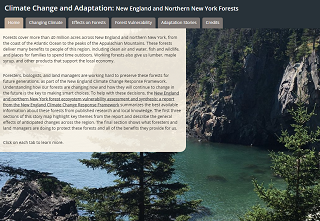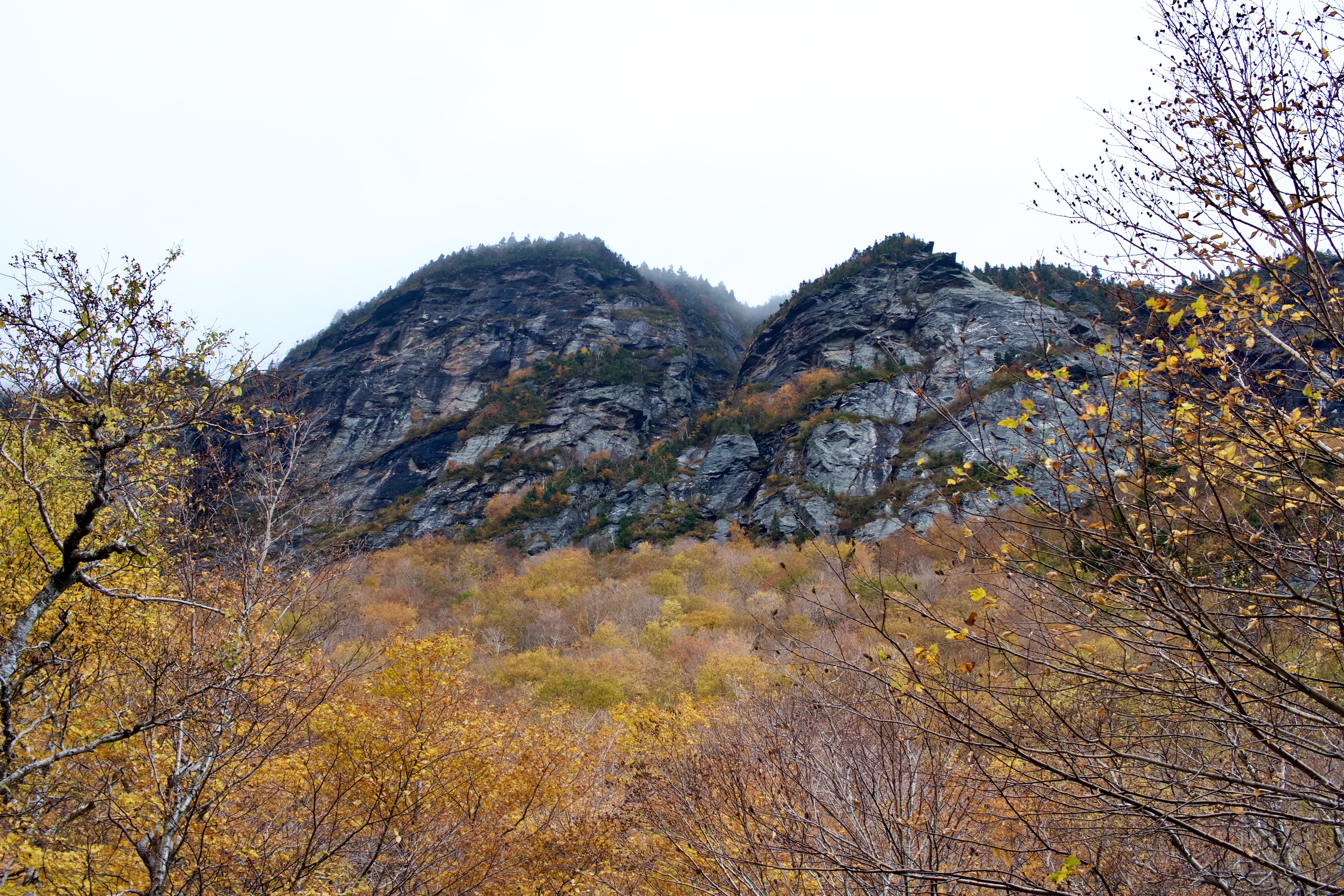The Climate Connection
Tools for understanding climate change and how it impacts forest ecosystems in the Northeast.
Get a quick handle on how climate change will affect temperature, precipitation, and other weather patterns in ways that are critical to forested ecosystems with this selection of online tools from trusted sources.
- Web Map
- Summary
- Historical
- Projected
- Both
- Temperature
- Precipitation
- Weather
How will forested ecosystems respond to climate change? What impacts are we seeing already? We have assembled a range of tools you can use to explore the observed and predicted impacts of climate change on forests and the water, wildlife and people that depend on them.
- Web Map
- Summary
- Historical
- Projected
- Both
- Forests
- Water
- Wildlife
- People
Click a topic to filter the list of tools

The Forest Ecosystem Monitoring Cooperative Climate Connection is a resource for policy makers, researchers, students and natural resource professionals to quickly find the tools they need to explore climate change and how it will impact forests in the Northeast.
Read our full report on the development of the Climate Connection
Why Develop the FEMC Climate Connection?
The FEMC Climate Connection is a simple portal to access key resources on climate change in our region and the impacts it will have on forested ecosystems. As we learn more about climate change and its impacts, a growing wealth of resources are at our fingertips, but finding the right tool for the right question can be a daunting task. Not only are there a variety of portals for exploring and accessing data on climate change itself, we are constantly learning more about how these changes impact northeastern forests. The FEMC Climate Connection makes it easier to quickly identify tools you can use to explore climate change and its specific impacts on forested ecosystem, curated by our staff and tailored to the Northeast. The FEMC Climate Connection is a point of access for three key resources:
- Tools for exploring how climate change will affect weather, temperature, and precipitation patterns in our region in ecologically meaningful ways;
- Tools for exploring or quantifying the impacts on forest resources that these changes will cause, from driving pest outbreaks to reducing streamflow to changing in the timing of key seasonal events;
- A collection of research on climate change in the Northeast available in the FEMC data archive.
With easier access to these resources, the FEMC Climate Connection gives Cooperators tools they need to understand the implications of climate change and incorporate them into the management of our forested ecosystems.
Organizations
The Climate Connection was developed by the Forest Ecosystem Monitoring Cooperative with long-term funding from the U.S. Department of Agriculture, Forest Service, Northeastern Area - State & Private Forestry.
We are grateful for the contributions of Maria Janowiak and Danielle Shannon of the Northern Institute of Applied Climate Science for their guidance in developing this product. We would also like to acknowledge the dozens of researchers and professionals who have contributed data to the FEMC data archive that helps improve our collective understanding of climate change in the region.
Missing Something?
While we have done our best to identify key resources for exploring climate change and the impacts it will have, we may have missed your favorite tool or resource. Please let us know by sending us a link and why you love it to femc@uvm.edu - we will follow up and get it added to the FEMC Climate Connection!
Regional Climate Change Research and Monitoring
FEMC Cooperators have collected an amazing amount of data and scholarly research on climate change in northeastern forests, and much of it is available on the FEMC Data Archive. Explore regional climate change-themed data in the FEMC archive.

Using methods like those used to make snow at ski areas, researchers successfully created ice glaze on tree branches (remarkably similar to conditions during the Northeast’s 1998 Ice Storm) over a large northern hardwood forest area. This novel experimental tool will allow scientists to study controlled icing events of different ...
Downloadable: 6 datasets

Red spruce winter injury, associated with red spruce decline in the Northern Forest, results from needle freezing that can lead to crown thinning and eventual tree mortality. We set out to measure impacts of this injury on long-term carbon storage in red spruce trees. We collected tree stem increment cores ...
Downloadable: 2 datasets

Tree cores were collected along with an inventory of regeneration for tree species at and near their elevational limits on five mountains in Vermont.
Downloadable: 3 datasets
And 51 more projects and datasets.
Climate Change Data
The FEMC Climate Connection focuses on tools that enable exploration and understanding. But if you are one of those people that wants to get straight to the data, here are a couple of links that might help you out.
- PRISM Climate Data
- The PRISM (Parameter-elevation Regressions on Independent Slopes Model) Climate Group uses a range of climate observations to develop spatial climate datasets (precipitation, temperature, vapor pressure deficit). The resulting datasets incorporate a variety of modeling techniques and are available at multiple spatial/temporal resolutions, covering the period from 1895 to the present.
- NCEI Climate Data Online
- The National Centers for Environmental Information (NCEI) provide daily climate summaries, marine data, along with global climatic summaries and local data. Data can be explored with a web map or search tool.
- National Forest Climate Change Maps
- The National Forest Climate Change Maps project was developed to meet the need of National Forest managers and are available for every National Forest in the contiguous United States with relevant data coverage, and include variables related to precipitation, air temperature, snow, and stream flow.
- Climate Change Atlas
- The Climate Change Atlas, produced by the USDA Forest Service, documents the current and possible future distribution of 134 tree species and 147 bird species in the Eastern US and gives detailed information on environmental characteristics defining these distributions.
- Climate Change Response Framework
- The Climate Change Response Framework is a resource that lists climate change projections for tree species, locates adaptation demonstration projects, and focuses on the forests of New England.
- Land Trust Alliance: Conservation in a Changing Climate
- This resource from the Land Trust Alliance is a toolkit for forest managers considering the impacts of climate change and also provides resources for managing forests from several perspectives.
- NOAA Advanced Hydrologic Prediction Service
- This NOAA resource shows all flood monitoring stations in the US and shows the probability of a river flooding or exceeding a certain level, volume, and flow.
- National Climate Assessment
- The National Climate Assessment contains graphs and charts relating to indicators of a warming world. The resource includes projected global temperature change, observed change in very heavy precipitation, acidification of oceans, and illustration of the differences between human and natural influences on climate.
Portals and Clearinghouses
There are many other portals and clearinghouses of climate information and regional and national scales, such as the USDA Forest Service’s Climate Change Resource Center, the New York Climate Change Science Clearinghouse, Climate Change in Vermont, Resilient MA and many others. While not exhaustive, the list below represents other places to find and access information.
- Northeast Climate Adaptation Science Center
- The Department of Interior's Northeast Climate Adaptation Science Center (NE CASC) is part of a federal network of eight Climate Adaptation Science Centers created to work with natural and cultural resource managers to gather the scientific information and build the tools needed to help fish, wildlife, and ecosystems adapt to the impacts of climate change.
- Climate Data and Tools
- A gallery of climate maps, tools, and resources pertaining to the climate, with an emphasis on forests ecosystems, provided by the USDA Forest Service.
- Resilient MA
- The Massachusetts Climate Change Clearinghouse (Resilient MA) is a gateway to data and information relevant to climate change adaptation and mitigation across the state.
- New York Climate Change Science Clearinghouse
- The New York Climate Change Science Clearinghouse (NYCCSC) is a gateway for policymakers, local planners, and the public to identify and access documents, data, websites, tools, and maps relevant to climate change adaptation and mitigation across New York State.
- NASA: Climate Change and Global Warming
- NASA's (National Aeronautics and Space Administration) climate site provides resources collected by NASA related to climate change.
- Massachusetts Climate Action Tool
- Use this tool to explore climate change impacts, learn about vulnerabilities and plan adaptation actions.
- Climate - Data Catalog
- A clearinghouse of publicly available data, with a focus on climate, that is hosted by U.S. General Services Administration, Technology Transformation Service. Other criteria can be designated to refine the search.
- Real-Time Data
- A gallery of real-time climate maps, tools, and resources, with a focus on climate-related events hosted by Climate Nexus.
- NCAR Climate Data Guide
- National Center for Atmospheric Research (NCAR) provides a comprehensive list of climate maps and datasets, mostly spatial. Products can be searched by location, time frame, and keyword.
- Adaptation Clearinghouse
- The Adaptation Clearinghouse, powered by Georgetown Climate Center, is an online database and networking site that serves policymakers and others who are working to help communities adapt to climate change.
- Climate Change Resource Center
- The Climate Change Resource Center (CCRC) provides access to information and tools concerning ecosystem management and climate change.
- TACCIMO
- The Template for Assessing Climate Change Impacts and Management Options (TACCIMO) is a collection of scientific publications describing effects of climate change impacts.
- How the Tech Community is Combating Climate Change + Free Resources and GitHub Projects
- The University of Texas at Austin has created a comprehensive resource for anyone, particularly those in the tech community, to use to help combat climate change and bring about open source solutions.
